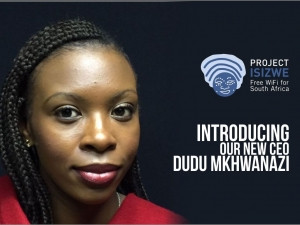
While the City of Tshwane has expressed its intention to expand the quality and reach of its free WiFi offering, it is looking to do so without the services of its current supplier, Project Isizwe.
Project Isizwe has been working with the city to facilitate the rollout of free WiFi in public spaces since the service was introduced in 2013.
However, the city, which is under new leadership following last year's municipal elections, says it is taking steps to put the free WiFi offering "on a lawful and sustainable footing".
Responding to ITWeb via e-mail, newly-appointed Project Isizwe CEO Dudu Mkhwanazi says the city plans to seek a different service provider as the non-profit's contract with the city is coming to an end.
"Project Isizwe and the City of Tshwane are still negotiating regarding the handover of the network. However, for now Project Isizwe continues to be the contracted service provider of the Tshwane free WiFi network."
Sole provider
Since inception, Tshwane has relied solely on Project Isizwe to create free Internet hotspots across the city.
The city's former executive mayor Kgosientso Ramokgopa said at the time that the introduction of the free WiFi service formed part of the strategy to build a robust ICT infrastructure to stimulate economic growth, improve the delivery of basic services and bridge the digital divide.
The Internet project has facilitated access for millions of residents and been hailed as the most innovative government programme and the biggest deployment of municipal free WiFi on the African continent.
Project Isizwe estimates reveal that nearly 600 000 Tshwane citizens use the network each month.
While the initial requirement was for each user to receive 1Mbps speed and 250MB daily data quota, Project Isizwe says it now delivers up to 15Mbps to the end-user and 500MB daily quota.

To maintain services in the interim, the Tshwane council approved an amendment to the contract with Project Isizwe, but there is no guarantee of continued business operations going further.
Mkhwanazi confirms a joint proposal was submitted and approved by the city council; however, it has not yet resulted in a signed service level agreement (SLA) between the city and Project Isizwe.
There is no specified date when the contract with the city is planned to come to an end, she notes. "That is what we are still negotiating with the city formally, as per the new SLA.
"All sites are operational, and those that from time to time are down, our technical team is working around the clock to resolve without compromising the service to the community of Tshwane," she adds.
Cost constraints
Despite a budget of R88.5 million for the project in the 2017/18 financial year, the city says it is simply not possible to sustain a full subsidy for free WiFi while expanding the existing network.
According to the city, it is seeking commercial investments and partnerships to perfect the free WiFi model. It also revealed it wants to put the operation and maintenance of the WiFi project out to tender or find other means of maintaining it without relying on a sole supplier.
The city adds its decision to bring in a new service provider is also to address the auditor-general's findings against the way free WiFi was initially procured.
Anesu Charamba, programme manager for the digital transformation practice at Frost & Sullivan, says a change of service provider need not necessarily be a good or bad thing.
What is important is that proper governance and procurement procedures are followed to ensure the best service provider is selected, Charamba points out.
The Tshwane project has been a fantastic boon to citizens, and continuing and maintaining the level of service delivery is a priority, he states.
"Following the proper governance procedures is important; ideally, they minimise the possibility of fraud or ill-equipped parties managing large projects. The initial project set a strong precedent for service delivery and a stronger infrastructure base. With proper governance and selection criteria, the next service provider can maintain and build on that."
Possible contenders
While there are no available timeframes when a new supplier will come on board to help Tshwane expand its free WiFi objective, there are various options the city can follow.
When the Ekurhuleni Metropolitan Municipality rolled out its free WiFi offering, for example, it selected Altech and MultiMedia InnoVations, a public transport consultancy and intelligent transport systems company, to join the free Internet revolution.
VAST Networks, which describes itself as SA's first open access WiFi provider, has told ITWeb it is in discussions with the city's council and awaiting the new request for proposal.
Charamba points out there are various players of suitable size, experience and technical capability able to come on board from the private sector.
"It's essentially a matter of whether a project of this nature fits into their current and future competitive or growth strategies in the market," he concludes.
Share